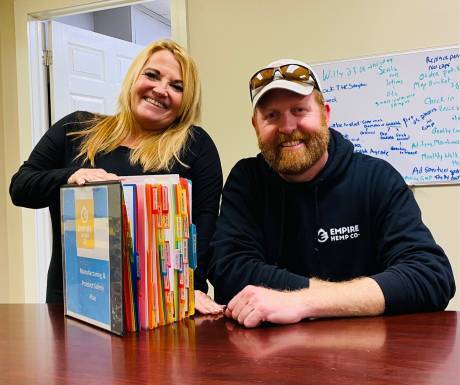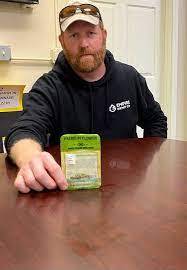
Photo by Joanne Beck.
City officials turned their thoughts to cannabis for a few moments this week as City Manager Rachael Tabelski described the plight of legal cultivators, locally Empire Hemp, which had originally been scheduled on City Council’s meeting agenda.
Company co-founders Chris Van Dusen and Shelly Wolanske were going to talk about an initiative to sell cannabis products at farmers markets, a concept being drafted in the Empire State for the summer season. However, Gov. Kathy Hochul recently squashed that move, which added yet another hindrance to a market that’s already suffered a slow roll-out of avenues to distribute and sell their products.
“(They) have been producing products in the legal market. Prior to cannabis being authorized by New York State was one that was authorized, they shifted to that market for cultivation. And they ramped up, and right now, they're sitting on over $300,000 worth of product and had to lay off four staff members because the Office of Cannabis Management cannot get retail licenses out quick enough. So there's over, I think it was 80, brands of cannabis that are certified by New York State, all sitting in warehouses full of cannabis, but only 10 legal retail outlets right now,” Tabelski said during this week’s council meeting. “And to get your product into the legal retail outlets, the majority being in New York City, you almost have to live in New York City or have a salesperson present down there. So anyone in the sales market knows you have to apply to those retail outlets to move your product.
“So I want you to be aware of the emerging market. This is a business that has typically enjoyed the support of the city. They've stayed in the city, and they've purchased or leased more space to produce their products. And right now, they're very much hamstrung. So I just wanted to bring that to everyone's attention.”
Council President Eugene Jankowski Jr. said that he’s heard about the illegal retail sites “that keep popping up in the city, and people think they have a license” when they actually do not.

Photo by Joanne Beck.
“So you’re telling me no one in Genesee County, no one in this area, has a legal distribution license itself?” he said.
That’s right, Tabelski said, “except if you’re on sovereign land.”
She’s referring to Tonawanda Indian Reservation, which does not have to abide by the same state regulations as other dispensaries. Van Dusen checked that site to see about the possibility of selling some product, but shop owners on tribal land wouldn’t pay what Empire Hemp, which deals with state taxes, charges, Van Dusen said.
He and Wolanske said they are disappointed with how things have happened with licensing — they were led to believe that some 30 dispensaries were to open in March — and with the prospective farmers market, however, they’re confidently looking forward.
"Mainly down in New York City, there are only 10 dispensaries. And there's 80 brands that are trying to get on the shelves in these 10 dispensaries. So it's very challenging to maintain, and we're currently in half of those dispensaries. But there needs to be more to make this a successful program, especially in our area," Van Dusen said. "And we were held up with that court-ordered injunction with a lawsuit that just finally opened up, you know, in the Finger Lakes region in Western New York a little while ago. So now we're about six months behind New York City, and getting dispensaries opened up here. So the first one to open next week in Buffalo. And we will be in that one. We're really excited about that. Dang 716."
Another one, MJ Dispensary, is to open in Henrietta in about a month, with a few more following in the Buffalo area. It takes time to open a site and includes a final walk-through by the Office of Cannabis Management, “so once they get their license, you're looking at a good three to five months,” Wolanske said.”
One element of the industry affects another — it’s a trickle-down effect, she said — from the grower to processors and end product. Empire Hemp still has goods from 2022 “because there’s no outlets for these grow cultivators to sell at, there’s not enough dispensaries,” he said. “So the cultivators are really hurting because it’s harder for them to get it to go to the dispensaries and get on the shelves because it’s so competitive to get on the shelf space.”
“So if they had 50 dispensaries open, well then, it would change, the demand would be in our favor, we wouldn’t be selling out of everything, it wouldn’t even be a question,” he said.
Tabelski ventured to guess what part of the problem is.
“I dare say that they're in over their head with the Office of Cannabis Management and the rollout of this program,” she said. Jankowski agreed, adding that, for what he understands the board makes — “in excess of hundreds of thousands of dollars in salaries” — they’re not doing their jobs.
The City of Batavia is far from alone in its assessment of the state agency’s efficiency. Rev. Kirsten John Foy, a spokesman for the Coalition for Access to Regulated & Safe Cannabis, called the OCM “ineffective at every turn.”
“Growers, CAURD (conditional adult-use retail dispensaries) licensees, disabled veterans, workers, consumers, medical cannabis patients and individuals harmed by cannabis prohibition are paying the price for its ineptitude — all while the illicit market booms,” Foy said in a New York Post article.
Similarly to what Jankowski and Van Dusen have noted locally, albeit on a lower scale, New York City Mayor Eric Adams has been tallying the number of illegal pot shops sprouting up in the absence of licensed dispensaries and manpower to close them down. In NYC, Adams’ count is 1,500, while Hochul’s office puts that number at 2,500, and law enforcement doubles that to 5,000 and estimates that illegal smoke shops are making $2,000 to $3,000 profits a day. While sites in smaller cities such as Batavia aren’t likely to claim such boons, is it a wonder why they’re popping up?
Empire Hemp will continue to operate by the book, as it has since the beginning, Van Dusen and Wolanske said. Their downtown retail store, which sells hemp products, is doing well and is self-sustaining, Wolanske said. In fact, “we’re doing better than last year,” she said. “We have a lot of faithful followers.”
And they look forward to finally seeing those promised 30 dispensaries, now to arrive in October, as they ride out a bumpy state cannabis program.
“So when that happens in this area, we will be set. So all that inventory is still good. It's not gone bad. So we could still sell that. And it's just a matter of getting these locations open,” Van Dusen said. “We’ve always done everything by the book, so we feel that it’ll be good that we did that. That will benefit us in the long run, because there will be less competition. Right now, we’re dealing with the illicit market. It’s really hard, especially when people are used to going into these smoke shops and paying a certain price.”
